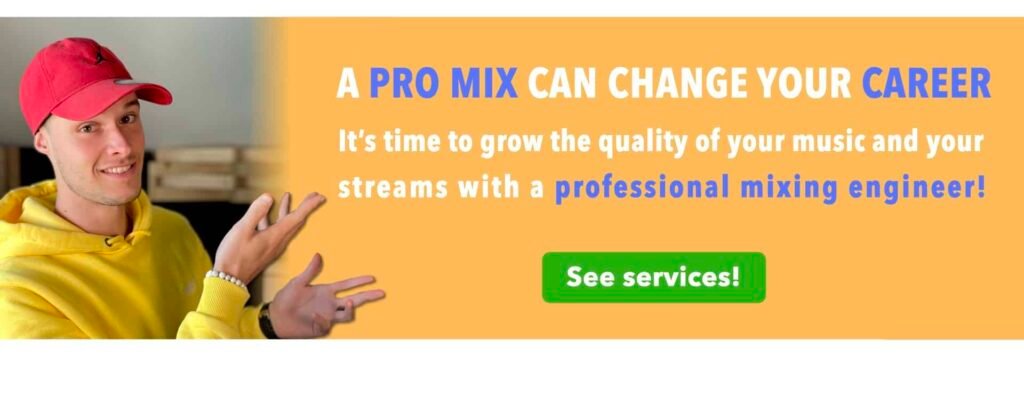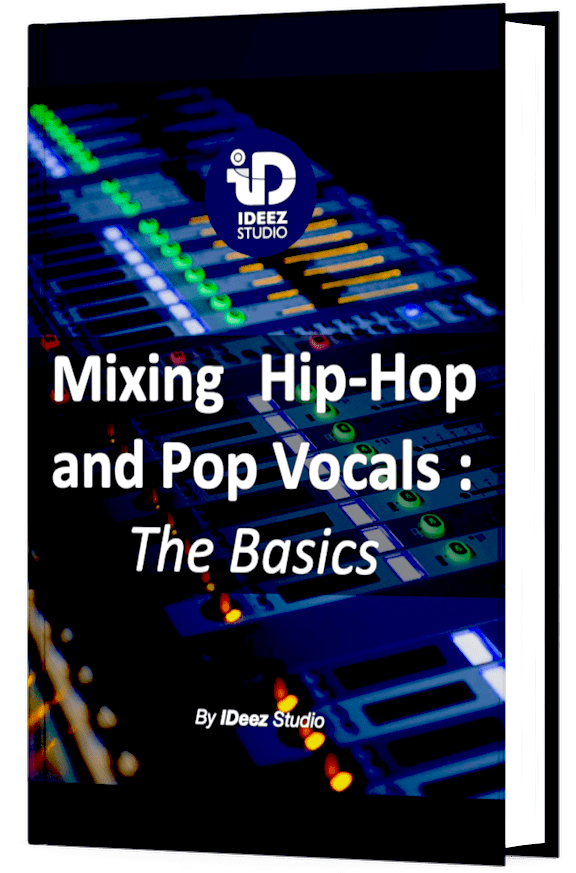“How much should I charge for mixing vocals to a beat?” is a question many mixing engineers entering the professional world ask themselves. And while values can vary depending on many factors, it’s essential to know what the trends are. 20$? 900$? I’ll give you the answer here!

The price to charge for mixing vocals to a beat will generally be between $75 and $350. This price depends on several factors that must absolutely be taken into account, including experience, audio quality, project workload and client’s budget.
Before providing any services…
Before providing music mixing services, it is essential to know how to start providing them. Indeed, simply knowing how to mix properly is not enough. You need to be able to install a robust framework around your services.
Why do you need to do this? Because people who pay for a service, in this case mixing services, need to be sure that they are dealing with a real professional in his/her field.
ℹ️ If you want to know more about this, then I suggest you read this article about How To Start Providing Music Mixing Services
Now let’s dive into what interests us today: How much to charge for mixing vocals to a beat?
Experience is key

Many factors will be taken into account in the calculations. There are also more personal factors that depend only on you and that it is therefore impossible to list in this article.
But the most important thing to consider is your experience. It is the key to all the other factors to be taken into account during your calculations.
For many, this may seem frustrating. Because even with little experience, you can sometimes be better (or feel better) than mixing engineers with decades of experience. Objectively, this is often a reality. Mixing trends change over time, and many “experienced” engineers get lost in this evolution.
But in the field, it’s always important to keep in mind that experience is something that many potential clients look at first. Put yourself in their shoes. If you wanted to build a house, you’d probably take a company with 15 years of experience, not the one that was created last year. It’s exactly the same situation here.
And even if the quality of your mixes is better than that of experienced mix engineers, your experience should be directly related to the average price you charge your clients.
Need a professional sound engineer specializing in pop and hip-hop mixing ? Great! Take a look at our services and let’s blow up your career together!
Let’s start now!
Are you experienced?
The term experience itself takes several factors into account. But the main factor of experience is still time / years. Here are a few indicators that will help you see where you stand:
- From 1 to 2 years: Even if it is frustrating, you must remain humble and consider yourself inexperienced in music mixing.
- From 2 to 5 years: You are moderately experienced. At this level, you have probably encountered many problems and challenging situations that have made your experience grow.
- From 5 to 10 years: Normally, at this stage you are clearly experienced in vocal mixing. I wonder why you’re even reading this article. Just kidding!
Your reputation is your career

Behind your experience, which is a more internal factor related to your skills, there is also your reputation. And even if you are not always aware of the reputation you have, you should try to include it in your calculations.
Today, thanks to (or because of) the internet, everybody knows everything about everybody else. Through reviews, through the content you post on social networks or through mutual acquaintances. And if your reputation doesn’t work in your favor, it’s pretty tricky to raise your prices.
How do you know your reputation?
Knowing your reputation, no matter what field you work in, is a very complex thing. Especially at a time when the information that circulates can very quickly be distorted. But some reliable factors can be taken into account.
- The first way to get an idea of your reputation is to analyze your reviews (Google, TrustPilot,…). If you don’t have a system that allows your customers to give reviews yet, I advise you to set this up as soon as possible. This will allow you to have a customer boost of at least 20% in the future.
- The second way to find out more is very simple: ask your customers what they think of your services, in a totally transparent way. If you insist on honesty, they will give you your strong and weak points. It is up to you to calculate the balance between positive and negative. You will then have more or less an idea of your reputation.
Whatever the verdict, it is essential to always want to improve your reputation over time. This is the element that will be key to the evolution of your career.
If your reputation is bad and you never work on it, your career will stagnate. But if you take the time to think about it and work on your shortcomings, your career as a mixing engineer will undoubtedly skyrocket one day.
How much time do you spend per mix?

One of the most important questions is also to ask yourself how much time you usually spend on a typical mix. And while this obviously varies from project to project, you can probably average it out.
Here again, it’s important to be humble and clear-headed, there’s no point in overestimating the speed of your workflow. Everyone works at different speeds. And there is nothing wrong with working slower than someone else. Or on the contrary to feel like you’re wasting every project because you’re so fast.
In general, the average time to mix vocals on a mixed beat is between 1 and 4 hours. This time can depend on the number of tracks to process, but also on the complexity of the vocal processing. Some projects require a lot of automation tracking. Those will always take more time. The efficiency of your workflow is also a key element of the time spent per project.

What is the ideal time per project?
- If you are close to one hour of work per project, that’s a very good thing! But be careful not to miss any important details, vocal mixing can be more complex than you think.
- If you’re closer to 4 hours per project, that’s also very positive. Because it means that you’re working with precision and attention. But if you think you can improve your efficiency, work on it!
Workload

The workload imposed by the project and/or the artist is also an important part of the calculation. Some projects require a huge workload compared to others. And the price you charge your client must absolutely depend on this.
But be careful, don’t fall into the classic trap of the number of tracks in the project to be mixed. Because contrary to what you might think, this is not directly related to the amount of work you will need. A project with 8 tracks can sometimes take more time than a project with 30 tracks.
Now, let’s be on the same wavelength: Yes, the number of tracks has an influence on the workload. But, no, the two factors are not directly related. There are other elements that need to be taken into account as well.
What factors affect workload?
- The main factor affecting the workload is the level of customer expectations. These expectations can be quite diverse on many levels. Some expect precision to the nearest tenth of a dB. But others are not so precise and just want to “feel” the quality of the overall vocal mix.
- The second factor, often forgotten by many vocal mixers, is the need for automation tracking. Indeed, automating the volume of certain sources, effects or certain dynamic and frequency processing takes a lot of time. At least when you automate with precision.
- And finally the number of tracks, which we have already mentioned earlier in this article.
The importance of each factor will not always be in that order. But generally, I would advise you to refer to them in that order.
Turnaround time

We talked about the time you spend on projects earlier in this article. But now let’s take a little more distance: How long does it usually take you to deliver a first version to your clients? In other words, what is your turnaround time?
To mix vocals to a beat, clients often expect a fairly fast turnaround time. Because they assume that just mixing vocals doesn’t require a lot of hard work. And even if this is a bad prejudice about mixing vocals, we have to be able to satisfy them. Because the customer is always king!
What is a good turnaround time for mixing vocals to a beat?
- To mix vocals on a beat, a good turnaround time is usually between 1 and 2 days. In a society where everything is available to everyone very quickly, this turnaround time will probably compete with the fastest mixing services on the market.
- In vocal mixing, a turnaround time of 3 to 4 days is more or less average. With a turnaround time like this, it won’t be part of the quality of your services, but it will never be taken as a defect either.
- On the other hand, a turnaround time of 5 days or more may seem very long to many of your potential customers. If this is the case, try to put in place systems that will reduce this turnaround time. You will gain in number of customers!
Client’s budget

Not all clients have the same budget to mix vocals to a beat. And the further you get in your career, the more the budgets will diverge. You have to be able to adapt to that with professionalism.
Before I talk about anything else in regards to adapting your prices to the client’s budget, I have one essential piece of advice to give you first. Find out the budget of each potential client as soon as possible after you make contact. This avoids misunderstandings and waste of time.
An established budget usually also allows you to know a little more about your potential client’s knowledge of the music business. This can sometimes also tell you more about the desired quality of the vocal mix.
How to adapt to the potential client’s budget?
Before you even ask for a potential client’s budget, you need to have a base price in mind based on all the above criteria. As you will have understood, you also need to have listened to a draft of his project to get an idea of the workload and the time it will take you to work on it. This will greatly influence your response to their budget announcement.
For the following explanations, let’s take as an example a base price around 150$.
- If their budget is above your base price, aim for the median value between your initial price and their budget, or even a little higher. The customer will be happy to get a lower price than they expected. And you’ll win, too, because the price charged will be higher than your average bill. If we start with our initial price of $150 and the budget is $190, then you can make a proposal at $170 or even $175 making everyone happy!
- If his budget is 1% to 20% below your base price, it will be better to make a proposal at your initial price. Most of the time, this kind of offer will be accepted. If the potential client really wants to work with you, a little effort will most likely come from him. Using our base of $150, anything above $120 will be a $150 proposal.
- All budgets that would be below 20% to 25% of your base price are either, for the lowest budgets, to be refused. Or, for the budgets close to 20%, to negotiate according to your initial price. Never go below 10-15% of your prices, or your business will stagnate.

To sum it all up…
You now have all the tools you need to create the right price offers for your services and your customers. But… it’s all missing numbers! And that’s probably why you’re reading this article.
That’s why I’ve decided to create a table that includes all the criteria mentioned in this article according to the key factor: your experience. Thanks to this table, you will be able to make an accurate estimation of the average prices you will charge your clients for mixing vocals to a beat.

As stated at the beginning of this article, these numbers are only trends. They will also depend on criteria that you consider important for your services and your clients.
But if you were a little confused, it still gives you a margin and a guideline to follow from near or far.
All factors are interrelated
Some price ranges may surprise you in one way or another, but keep in mind that all these factors are interrelated.
For example, it will always be more complicated to get a good reputation by having a super long turnaround time. Just as it will be complicated to have a fast turnaround time if you spend hours on small projects.
For the sake of your services, and therefore potentially your career in this field, it is essential to evolve every factor to make your business grow quickly.
Sometimes it only takes one factor to stagnate all your services and miss the opportunity to grow your client list. So, once again, don’t hesitate to get feedback from your customers, it will be the best way to progress and grow!
Quote system or unit price?
For several years now, since access to music production has become more accessible than ever, a great deal of excitement has reigned. This debate is based on the question: “Should I charge my clients with a unit price or should I adjust it through quotes?”
There is no absolute truth to this question. As you have read in this article, some points are based on a unit pricing system. Others, for the most part, are based on a system of adapting the price according to the proposed project. So, what to choose?
In fact, when it comes to vocal mixing on beats, it is easier to answer than with other types of mixes. Because the projects are often similar in structure and genre (which is often hip-hop).
With this type of music mixing, it is easier to establish average mix times, automation systems, quality templates and thus lighten the workload. This means that the price range varies very little between each project.
So?…
Knowing this, I advise you, if you don’t have many years of experience, to set fixed prices that you will charge to all your clients, whoever they are. This will allow you not to complicate your life too much and to avoid problems with people who don’t always understand how the music business works.
But if you already have a few years of experience under your belt, a quote system is much more suitable. Why is that? Because the more you evolve, the more complex the projects become. At that point, the “classic” projects with a vocal lead on a 2-track beat will go away to make room for more accomplished projects. And therefore more complex to mix.
If you take all the criteria of this article into account, you will clearly not be able to establish price trends anymore. It will be necessary to adapt your prices to each project.
In the end, you must learn to know your clientele and adapt accordingly. That’s when you’ll be able to get more and more professional customers, with a higher budget.
Need a professional sound engineer specializing in pop and hip-hop mixing ? Great! Take a look at our services and let’s blow up your career together!
Let’s start now!
Conclusion
To offer vocal mixing services on a beat, many factors are to be taken into account in your price calculation. Your experience (priority), the time you spend, the workload of the project, your turnaround time, the budget of the client,… Each criterion has its importance in the calculation.
To make correct price estimates, you must always remain humble while being aware of your skills. This is not always easy, but years of experience will give you many answers.
If you have any questions about this topic or anything in the field of vocal mixing, please contact me, I’m always happy to help!
Related Articles:
My favorite tools for mixing pop and hip-hop music:
Plugins
In the field of auto-tune, I’m convinced that nothing’s better and more efficient than Antares Auto-Tune Pro. As for the EQ’s, FabFilter Pro-Q3 and Slate Digital Infinity EQ are, in my opinion, the best tools. For compression, I have 2 favorites plugins: Waves RComp and UAD EL8 Distressor.
As for reverb, I’m a big fan of the Soundtoys Little Plate, but generally, I go for the Valhalla VintageVerb for its versatility. I also love the Arturia Rev PLATE-140 and the UAD Pure Plate for its organic side.
Headphones
The closed headphones I love and will always love using for mixing pop and hip-hop music are the Beyerdynamic DT-770. As for the best open-back headphones, I use the Sennheiser HD600 headphones, and I’m really happy of them!
Monitors
Having a pair of Yamaha HS7 in its studio or home studio is always cool for more excitement while listening to your mixes. The Adam Audio T7V monitors are also super accurate. In my studio, I also have a pair of Genelec 8030 for their reliability.
Hardware gear
For anyone who wants to start using hardware in their mixes, I always recommend these 2 units from Klark Teknik: the EQP-KT and the 76-KT. Don’t forget to use good converters, such as the Apollo interfaces. This is essential for a good rendering.






